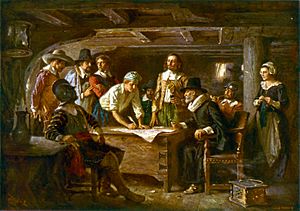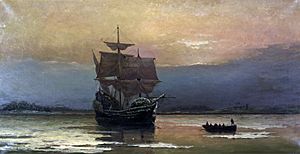Edward Doty facts for kids
Edward Doty (born around 1599 – died August 23, 1655) was a passenger on the famous 1620 voyage of the ship Mayflower to North America. He was also one of the people who signed the important Mayflower Compact.
Contents
Edward Doty: A Mayflower Passenger
Early Life in England
Edward Doty came from England, but we don't know exactly where. Some historians think he might have been from a place called East Halton in Lincolnshire. It's believed he traveled with another passenger, Stephen Hopkins, as his servant.
The Mayflower Journey

Edward Doty left Plymouth, England, aboard the Mayflower on September 6, 1620. The ship was about 100 feet long and carried 102 passengers, plus a crew of 30 to 40 people. Conditions on board were very crowded.
After about two months, the ship faced strong storms. The ship's wood shook badly, and water leaked in, making passengers wet and sick. There wasn't enough good food, and the ship was not very clean. This made the journey very hard for many people, especially women and children. Two people died on the way. But the worst was yet to come. After they arrived, nearly half the passengers died during the cold, harsh winter in New England.
On November 9, 1620, after about three months at sea, they finally saw land. It was a place called Cape Cod Hook, which is now Provincetown Harbor. They tried to sail south to their planned destination in Virginia. However, strong winter seas forced them to turn back. They anchored in Cape Cod hook on November 11.
Signing the Mayflower Compact
The Mayflower carried two main groups of people: the Pilgrims, who wanted religious freedom, and "strangers." The "strangers" included merchants, skilled workers, and indentured servants. Indentured servants were people who agreed to work for someone for a set number of years to pay for their trip.
The Mayflower was supposed to land in Virginia. But because storms made them land in Massachusetts instead, some indentured servants argued that their contracts were no longer valid. William Bradford, a Pilgrim leader, wrote that some "strangers" were unhappy and spoke of rebelling.
To prevent trouble, the Pilgrim leaders decided to create a set of rules for everyone to follow. This agreement was called the Mayflower Compact. It was a promise to rule themselves by what the majority agreed upon. Edward Doty and 40 other male passengers signed the Mayflower Compact. His name appears as "Edward Doten." The Mayflower Compact was very important because it helped lay the groundwork for later American documents like the Declaration of Independence and the U.S. Constitution.
Life in Plymouth Colony
In late 1620, Edward Doty joined Stephen Hopkins and others to explore the Cape Cod area. They were looking for a good place to build their new settlement.
In the records of Plymouth Colony, Edward Doty's name was spelled in different ways, like Doten, Dotey, Dolton, and Dowty.
Edward Doty later became a wealthy landowner. However, he had a strong personality and often got into arguments. Because of this, he appeared in the Plymouth court many times over the years.
Doty's Personality and Disputes
Edward Doty was one of the Mayflower passengers whose personality is well-known from old records. He had a quick temper and was often involved in disagreements, especially about business. While other troublemakers were sometimes forced to leave Plymouth, Doty lived there for the rest of his life.
His first problem with the law happened soon after the Pilgrims started building their settlement. In June 1621, Edward Doty and another servant, Edward Leister, had the first recorded fight in New England. They used a sword and a dagger. One was hurt in the hand, and the other in the thigh. Their punishment was to be tied together, head and feet, for 24 hours without food or drink. But their master, Stephen Hopkins, felt sorry for them. He asked the governor to release them, promising they would behave better, and they were set free.
Land and Community Role
In 1623, Edward Doty received one acre of land. Later, he was given an additional twenty acres. Records from the 1630s and 1640s show he bought and sold a lot of land, which made him quite successful. He even owned land in central Plymouth where the Mayflower Society House stands today.
In 1626, Edward Doty was one of 27 "Purchasers." These were people who bought shares in the colony's joint-stock company. This company was later managed by a group of senior colony members called the "Undertakers."
Records from the Plymouth Court after 1632 show that Edward Doty was involved in 23 cases over 20 years. These cases included arguments about money, property, and other disputes. Even though he was often in court, he was rarely punished beyond small fines. Most of his cases were civil disagreements, not serious crimes. He was lucky, as punishments back then could include whipping or banishment.
Despite his court appearances, Edward Doty lived a normal life as a free man. He paid his taxes and debts. He also received land grants and other benefits because he was one of the "first comers" to the colony.
Edward Doty did not serve on juries or hold political office, which was unusual for someone who was a Purchaser and an early free man. The only time he was recorded doing something for the community was in 1643. He was assigned with others to build a wolf trap in a town called Plain Dealing. In August 1643, his name appeared on a list of men in Plymouth who were able to carry weapons.
Edward Doty's Family
Edward Doty married Faith Clarke on January 9, 1635. Faith was the daughter of Thurston (Tristram) and Faith Clarke. She arrived in the colony in 1634. Some of Doty's court cases involved his in-laws, the Clarkes, suggesting some of his legal issues might have been family disagreements. William Bradford noted that Doty "by a second wife hath seven children, and both he and they are living." They later had two more children, making a total of nine children.
After Edward Doty died, Faith married John Philips on March 14, 1666/7. She moved to Marshfield and passed away there on December 21, 1675. She was buried at Winslow Cemetery in Marshfield.
Children of Edward and Faith Doty:
- Edward (born around 1636) drowned in Plymouth Harbor on February 8, 1689/90. He married Sarah Faunce and had eleven children.
- John (born around 1638) died May 8, 1701. He married Elizabeth Cooke and had nine children. Elizabeth's mother was a daughter of Mayflower passenger Stephen Hopkins, and her father was a son of Mayflower passenger Francis Cooke. John later married Sarah Jones and had three more children.
- Thomas (born around 1640) died in December 1678. He married Mary Churchill and had three children.
- Samuel (born around 1642) died between September 18 and November 9, 1715. He married Jeane Harman and had twelve children.
- Desire (born around 1645) died on January 22, 1731. She married William Sherman and had six children. After he died, she married Israel Holmes and had two children. After he drowned, she married Alexander Standish and had three children. Alexander's father was Pilgrim Myles Standish.
- Elizabeth (born around 1646) died on April 7, 1742. She married John Rouse and had three children. After he died, she married William Carver but had no children.
- Isaac (born on February 8, 1647/8) died after January 7, 1728. He married Elizabeth England and had five children.
- Joseph (born on April 30, 1651) died around 1732. He married Deborah Ellis and had ten children. After she died, he married Sarah (Woodin) Edwards.
- Mary (born around 1653) died before June 13, 1728. She married Samuel Hatch and had nine children.
His Final Years
Edward Doty wrote his will on May 20, 1655. He said he was "sicke and yet by the mercye of God in perfect memory." He signed his will with a mark, as he never learned to write. This is how he signed all his property papers.
Edward Doty died on August 23, 1655, in Plymouth, Massachusetts Bay Colony. There is a memorial stone for him in Burial Hill Cemetery.
His belongings were listed on November 21, 1655. His will was presented to the court on March 5, 1655/6.
Faith Clarke Doty Philips also made a will on December 12, 1675, and died on December 21, 1675. She named her daughters Mary, Elizabeth, and Desire, and her son John. She was buried in Winslow Cemetery, Marshfield, Massachusetts, where her memorial stone still stands.
| Notable descendants of Edward Doty |
|---|
|
Generations in this list begin with Edward Doty's children as the first generation.
|
 | Frances Mary Albrier |
 | Whitney Young |
 | Muhammad Ali |


